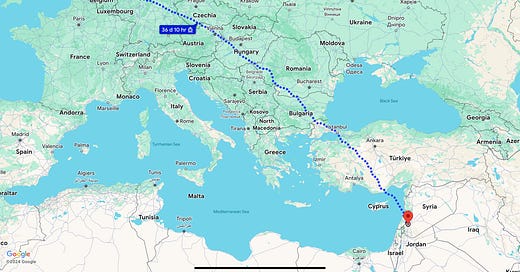How Walking the Equivalent of London to Damascus Transformed My Health and Creativity
Over the past year, I have walked around 4,200 km (2609 miles). That's the equivalent of walking from London to Damascus, Syria. When you break that down, it comes to 15,000 steps a day.
Walking 15,000 steps a day over the course of each week has convinced me that walking is one of the best activities you can do for your health and creativity.
I used to walk much less - 5,000-7,000 steps a day - and I was feeling sluggish and uninspired. Why? Because I thought I had to do everything in a fixed indoor location. And I didn't care enough about my health and well-being.
- Writing? Needed to be on my iPad or MacBook
- Reading? Needed to sit in a chair.
- Fitness? Needed to be in the gym. Or I couldn't be bothered.
- Thinking and Strategy? Needed to be at my desk taking notes.
Around eighteen months ago I realized I was mistaken and decided to change my life. Now, I make the most out of my walks and try to accomplish as much as possible during them.
- Listening to podcasts, YouTube videos, and Audible books
- Outlining and note-taking
- Filming video, photography, vlogging
- Inspiration and idea generation
- Low impact cardio for heart health and calorie burning
- A mental health boost from spending time in nature and bonding with my dog, Buddy.
Walking has now become a vital part of my day, rather than an occasional activity or something I do only when I need to go shopping. And I only sit at my desk for tasks that are complex and require a computer.
Walking becomes much easier when you have a purpose and stick to the same times each day.
During the week, I typically go for a walk in the morning and afternoon, each lasting about 40–60 minutes, from Monday to Friday. On weekends, I tend to travel and spend more time with my family, so I walk a lot less. Altogether, I average around 15,000 steps a day over the course of a full week.
Last month (April 2024), for example, I walked 330 km (205 miles), or 454,788 steps. It took 90 hours and burned 15,300 kcal. My daily average was 15,159 steps. In contrast, back in April 2018 I walked 135 km (83.8 miles), or 207,650 steps. That took 35 hours and burned 8,554 kcal. My daily average was 6,922 steps.

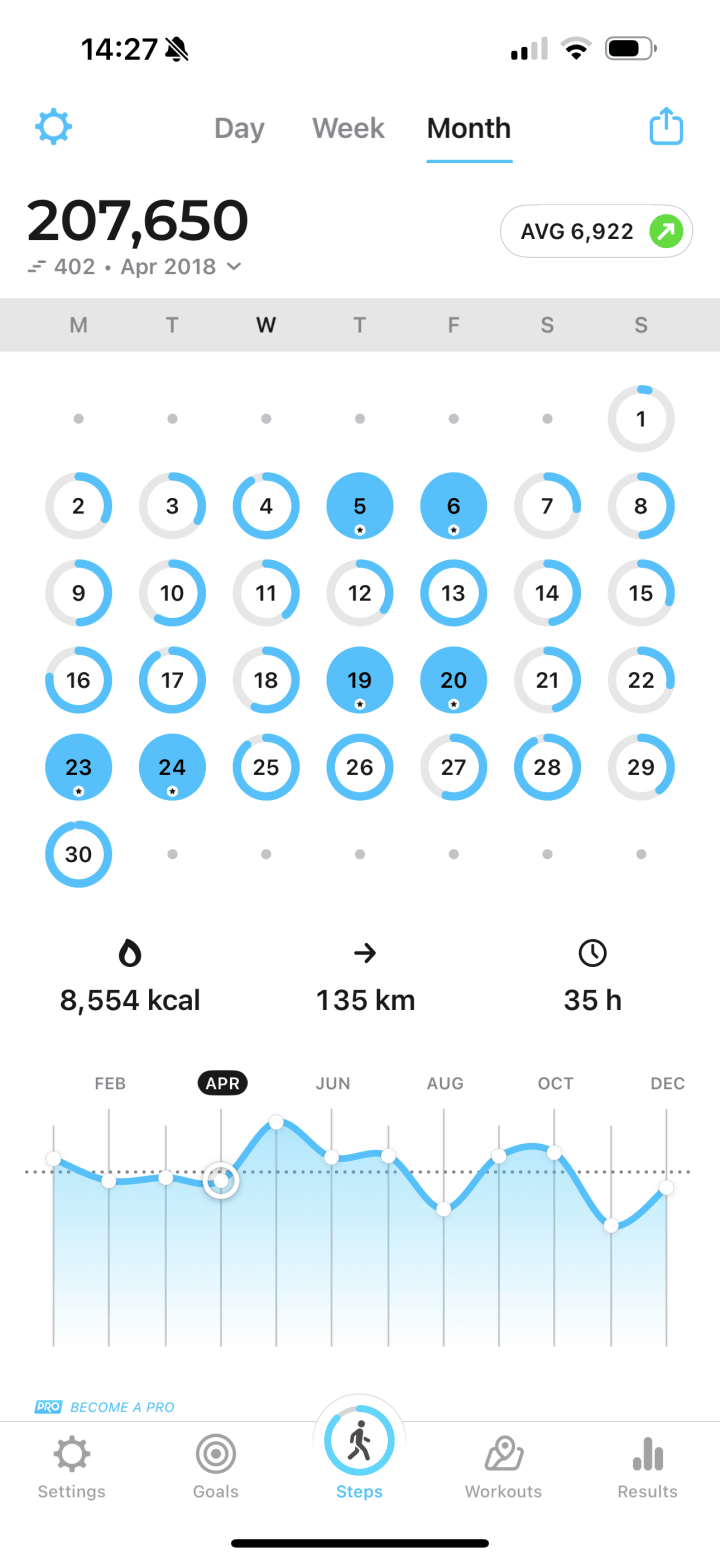
Taking just two walks five days a week can add up to a considerable distance. This simple habit can significantly boost your health and productivity due to the positive compounding effects over time.
Physical Health Benefits
- Heart Health: Regular walking increases your heart rate and improves circulation, resulting in better cardiovascular health and a decreased risk of heart disease. I typically walk at a pace of 3-5 km per hour, which for me corresponds to zone 2 cardio, or 60-70% of my maximum heart rate. Zone 2 is the aerobic zone, where you can build endurance and burn fat efficiently. On the other hand, Zone 4, which corresponds to 80-90% of your maximum heart rate, is the anaerobic zone. This zone is characterized by short, intense bursts of activity, such as sprinting.
- Weight Management: The more steps you take, the more calories you burn, which helps with both weight loss and weight maintenance. For example, last week I averaged 17,631 steps per day, which burned approximately 5,773 calories. To put it in perspective, there are 7,700 calories in 1 kg of fat. It's important to keep in mind that while walking can aid in weight loss, what you eat and how much you consume play a much bigger role in managing your weight.
- Improved Lung Capacity: Walking regularly helps enhance lung capacity and function. As you walk, your breathing rate increases, allowing more oxygen into your body and expelling more carbon dioxide.
- Strengthened Muscles and Bones: Regular walking not only strengthens your leg muscles but also helps maintain bone density, making it a great way to reduce the risk of osteoporosis.
Mental Health Benefits
- Stress reduction: Engaging in regular physical activity, such as walking, particularly in natural surroundings, can assist in reducing the stress hormone cortisol levels and alleviate feelings of anxiety. Personally, I maintain a brisk, steady pace that, over time, develops into a natural and calming rhythm.
- Improved mood: Walking boosts the production of endorphins, also known as the ‘feel-good’ hormones, which naturally help to relieve stress. Studies have shown that regular, moderate exercise, such as walking, can have effects similar to antidepressants for individuals with mild to moderate depression.
- Enhanced sleep: Physical activity, such as walking, not only improves sleep quality but also promotes healthier sleep patterns.
- Boosts brain function: Walking stimulates blood flow to the brain, aiding in enhancing of cognitive abilities and memory retention.
Creative Benefits
Incorporating walking into your daily routine doesn't just boost your physical and mental health; it profoundly impacts your creativity as well. Personally, I've found that the time I spend walking is often the most creative part of my day.
Here are a few reasons how walking boosts creativity.
- Walking encourages the mind to roam free, fostering divergent and disruptive reflection. A word of caution: make sure your mind doesn't stray into negative thinking! I discuss this further in my article titled “You Become What You Meditate On.” A walk is a great opportunity to listen to a podcast or an audiobook, sparking new ideas for your business or overlooked aspects of your life. I absolutely love podcasts and other audio content, and I always use my walking time to enjoy them.
- Walking can significantly improve concentration and mental clarity by boosting blood flow and oxygen to the brain. This enhancement sharpens our cognitive abilities, clears mental fog, and paves the way for fresh, innovative ideas to emerge.
- There's truth in the saying "walk it off.” Walking improves mood by reducing stress and anxiety, creating a more conducive environment for creative thinking.
Walking isn’t just great for generating ideas; it’s also a fantastic way to tackle complex problems:
- Perspective Shift: Physical activities like walking can offer a fresh angle on issues.
- Improved Focus: Regular walkers often find that their focus and concentration are sharpened, which is essential for effective problem-solving.
- Subconscious Processing: Walking gives your mind a break, enabling your subconscious to work on solutions.
Walking can also be a profound source of inspiration. Different environments and stimuli during a walk can trigger innovative ideas and motivate you to tackle new challenges. Whether in a bustling city or a serene park, the experience can spark creativity and inspiration.
So, how do I make this happen?
Adopting a routine of walking 15,000 steps a day can seem daunting, but with the right approach, it is entirely achievable.
Setting realistic goals is crucial for developing a sustainable walking habit.
So, begin by assessing your current daily steps and gradually increase your target. To do this, you will need a step tracker/pedometer. Most smartphones track steps. You can also use fitness trackers such as Fitbit or Garmin. Personally, I use my Apple Watch as a step counter. I also wear a Whoop band that tracks "strain" measured through my heart rate.
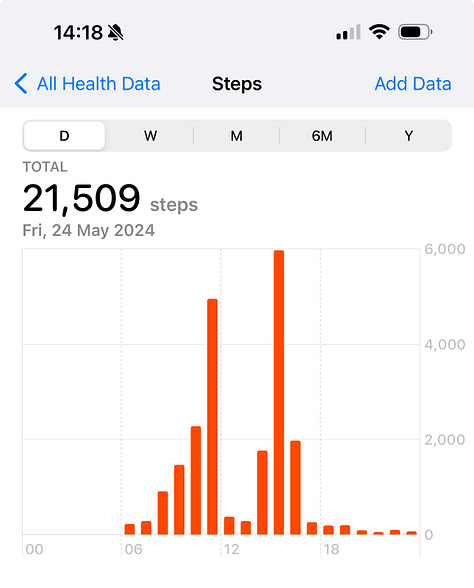
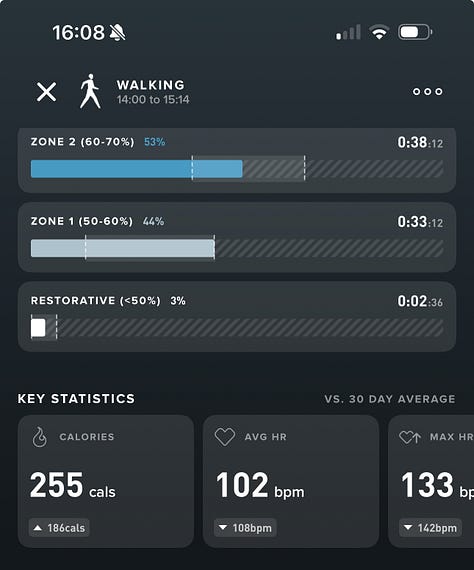
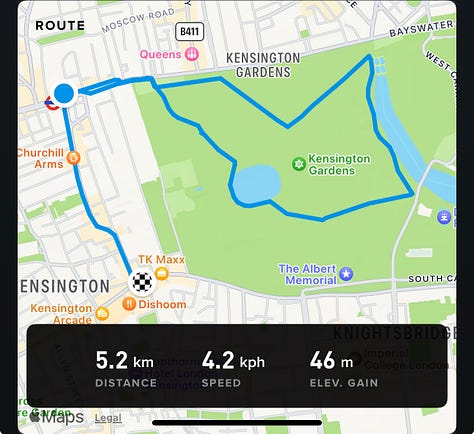
I'm assuming that if you are reading this, you probably have a smartphone that can do the job. If you have no phone (seriously!) you will have to make an estimate. If you walk at a moderate to brisk pace, then 15K steps will take you approximately 2-2.5hrs. I take two long walks per day, ranging from 40 minutes to 1 hour and then I have shorter walks for running errands.
Once you determine your average daily step count, here’s an effective way scale up:
- Start small: If you're used to taking only 5,000 steps a day, aim for 6,000, and gradually increase by 1,000 each week until you reach 15,000. Note: 5,000 steps or less per day is considered sedentary. Your progress will largely depend on your current fitness level, so take your time and cultivate patience. Remember, don't settle for what feels easy. Look for week-to-week improvements to create a positive feedback loop, which will help you start reaping the benefits of regular walking.
- Utilise a step tracker: As mentioned before, I depend on my Apple Watch to track my steps and also receive data feedback from my Whoop band. One of the great benefits of tracking your walking is that it offers an honest overview of your activity levels, allowing you assess if you are truly putting in the effort. Additionally, it shows your health improvements over time through changes in your heart rate and other stress indicators. Plus, you can check your progress toward your goal at any point during the day.
- Mix walking with other activities: Enhance your walking experience by incorporating into it other tasks. You could listen to podcasts or audiobooks, catch up on messages, or even brainstorm ideas for work. Personally, I love brainstorming new recipes for my family while I walk. When I need to jot down an idea, I use apps like Drafts for simple notes or QuickCapture Fast Notes for writing, voice notes, or photos. Before I discovered these apps, I used to carry a Field Notes notebook and a pen.
While aiming to walk 15,000 steps daily, you may encounter various challenges like bad weather or hectic schedules. However, there are effective strategies to deal with these obstacles:
- Indoor alternatives: Use a gym (or home) treadmill this looks fun .
If you're feeling really desperate and don't mind potentially annoying your family or housemates, consider walking up and down the stairs when the weather isn't great outside.
- Plan ahead: Schedule your walks as you would meetings – this ensures you allocate dedicated time for them. But don't get weird about it. This activity should be enjoyable, not a super-strict routine or an obsessive task. It's perfectly okay if you miss a few days. What truly matters is your overall progress and the positive direction you’re heading in over time.
- Motivational kit: Invest in some walking gear, but preferably not those ski-style sticks I see some people use! I'm a new convert to barefoot trainers. They are like a workout for your feet. After one walk, I felt like my legs and feet had been tested and trained. It’s an interesting sensory experience as well because you can feel the ground beneath your feet - similar to being barefoot but not as intense! The ones I have are Vivobarefoot Primus Lite III. I chose a size bigger than my shoe size. They’re fun and a bit odd. I’m going to call them my Mike Tysons.
Walking 15,000 steps a day has been a game-changer for my health, creativity, and productivity. Taking time away from the desk to move more has not only enhanced my physical well-being but also given a significant boost to my creative and productive outputs. Whether brainstorming new ideas or managing daily communications, incorporating walking into my professional routine has been invaluable.
I encourage everyone to try increasing their daily steps and experience the benefits firsthand. It could be the boost you need to feel happier, healthier, and more inspired each day.
Thank you for taking the time to read this message. If you found it interesting, please consider sharing it with someone you believe would also find it valuable.


